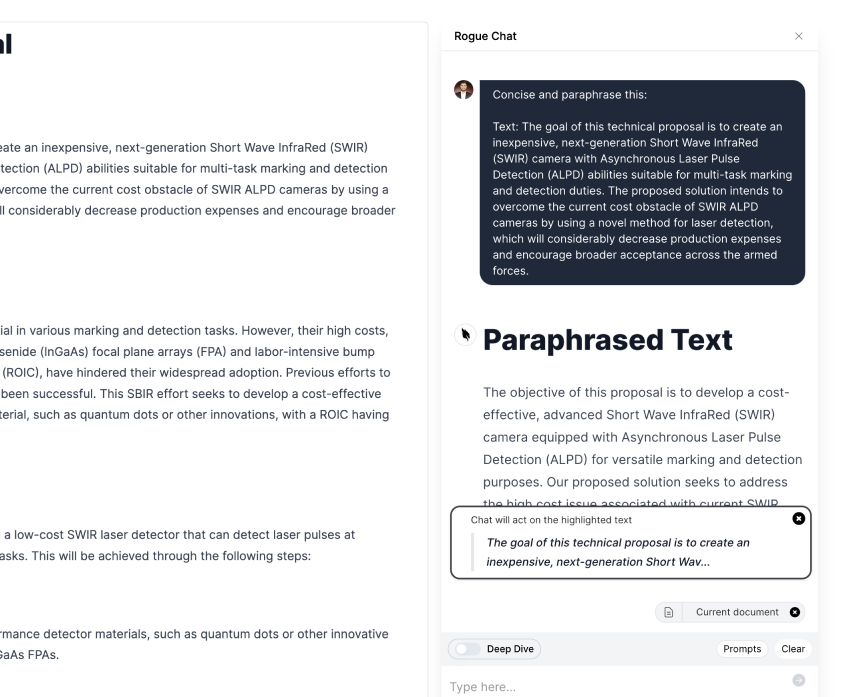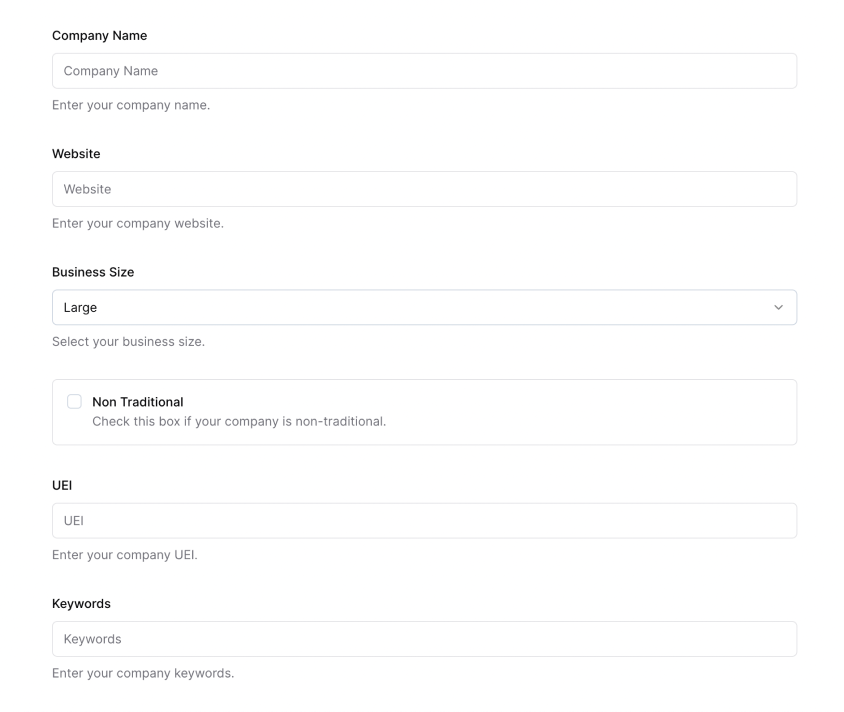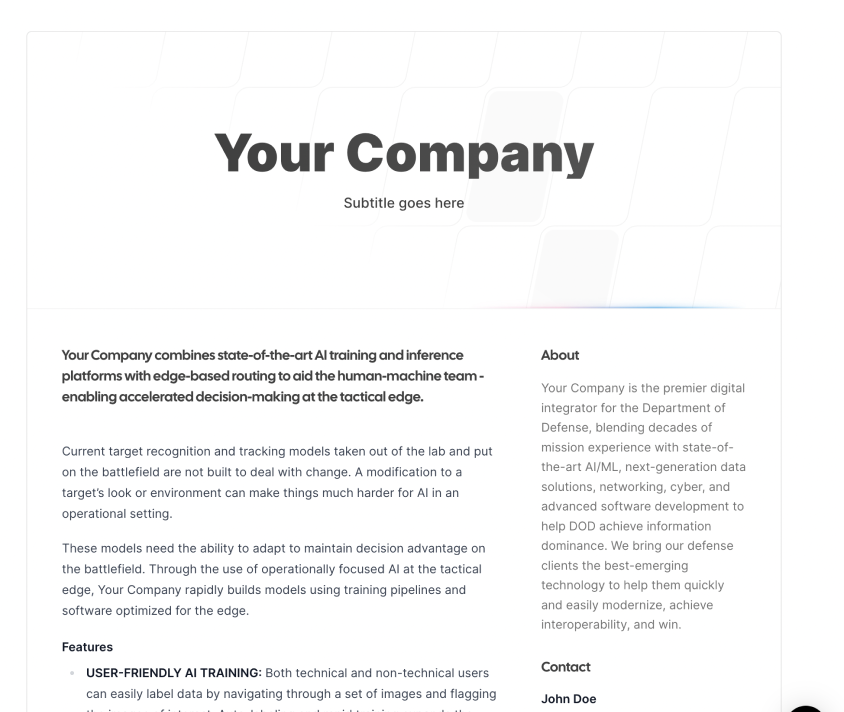
Stepping into the Government Contracting World: Small Business Edition
As a small business owner, you may be wondering how you can tap into the lucrative world of government contracting. While government contracts can provide an important source of revenue for many small businesses, there are unique challenges and tailored strategies that you should be aware of when entering this field. In this blog post, we will explore the things to watch out for and strategies that small businesses should adopt when venturing into government contracts.
Table of contents
As a small business owner, you may be wondering how you can tap into the lucrative world of government contracting. While government contracts can provide an important source of revenue for many small businesses, there are unique challenges and tailored strategies that you should be aware of when entering this field.
In this blog post, we will explore the things to watch out for and strategies that small businesses should adopt when venturing into government contracts.
Things to Watch Out For
Incumbent Capture
Incumbent capture is a common phenomenon in the world of government contracting, which essentially gives an existing contractor an advantage over other companies when it comes to securing new contracts. This is due to their familiarity with the customer expectations and past performance in the exact work, which can make it difficult for new companies to compete on an equal footing. In many cases, incumbent contractors have spent years building relationships with key decision-makers within government agencies and have developed a deep understanding of what their customers are looking for. They also have a proven track record of delivering high-quality work that meets or exceeds expectations, which further strengthens their position.
For small businesses that are just starting out in the government contracting space, this can be particularly challenging. With limited resources and little experience working with government clients, they may struggle to gain traction against larger incumbents who already have established relationships.
However, there are ways for small businesses to overcome this challenge. One effective strategy is to focus on developing strong relationships with potential customers early on. By reaching out proactively and engaging with decision-makers at different levels within agencies, small businesses can start building trust and establishing themselves as credible partners. This approach requires patience and persistence, but it can pay off in the long run. Small businesses that invest time and effort into relationship-building can differentiate themselves from other bidders who may not have established those connections. They also demonstrate that they understand the agency's needs and priorities, which can be a significant advantage during the proposal evaluation process. Small businesses should aim to engage with decision-makers across multiple levels of an agency hierarchy. This includes program managers who oversee specific projects or initiatives, contracting officers who manage procurement processes, and senior executives who set overall strategic direction for the organization. Building relationships takes time, so small businesses should start early in their outreach efforts. They should also be prepared to provide value beyond just selling products or services – for example, by offering insights or solutions that address specific pain points within an agency's operations or mission.
Another approach is to seek out subcontracting opportunities with larger prime contractors who already hold contracts within the agency. This allows small businesses to gain valuable experience working on smaller projects while also building relationships that could eventually lead to more substantial opportunities down the line. Ultimately, incumbent capture represents both a challenge and an opportunity for small businesses entering the government contracting arena. While it may be difficult at first to break through established barriers, To overcome this challenge, small businesses should focus on building relationships with potential customers and demonstrating their ability to meet their needs. This can help small businesses create tailored solutions that differentiate them from the incumbent contractor.
Wired Opportunities
When it comes to government contracting, there are at time pre-existing relationships that can greatly affect your ability to compete for certain contracts. These wired opportunities may include exclusive contracts with a particular vendor or limited bidding pools that only include specific companies. Identifying these wired opportunities is crucial for small businesses looking to succeed in the government contracting world. Not only can pursuing non-competitive contracts waste precious time and resources, but it can also damage your reputation within the industry if you are seen as someone who does not understand how the system works. To avoid these pitfalls, take the time to research potential contracts thoroughly before committing any resources. Look into previous awards and determine if there are any patterns of exclusivity or favoritism towards certain vendors. Reach out to contacts within the industry and ask questions about their experiences with similar contracts. By understanding which contracts are truly open for competition and which ones have already been wired up by existing relationships or agreements, small businesses can position themselves strategically for long-term success in this lucrative market.
For small businesses looking to enter the world of government contracting, identifying "wired opportunities" is essential. Wired opportunities refer to potential contracts that are already earmarked for a specific company or contractor, making it difficult for other businesses to compete fairly. To ensure that they're not wasting their time and resources pursuing unwinnable contracts, small business owners should conduct thorough market research before bidding on any project. One crucial step in this process is reading solicitations in detail and comparing them against the profile and capabilities of the incumbent - the existing contractor who may have an inside track on winning future bids. If a solicitation seems tailored towards describing one particular company's strengths or weaknesses, then it could be a sign that this opportunity has already been wired. While discovering wired opportunities can be discouraging for small businesses hoping to break into government contracting, it's important not to give up entirely. By conducting extensive market research and carefully analyzing each solicitation before submitting a bid, entrepreneurs can increase their odds of success even when competing against established contractors with more experience or connections within the industry.
"Bring Me A Colored Rock" Scenario
The “Bring Me A Colored Rock, I'll know the right color when I see it” scenario is a situation where the customer has a general concept of the end capability that they want, but are unsure how to get it, or they simply cast a wide net to see what innovative ideas reside in industry. You may see these in open Broad Agency Announcements or Challenge topics that ask you submit your solution and the customer will determine if it is compelling. The "Bring Me A Colored Rock" scenario is a common challenge faced by small businesses entering the government contracting world. The key to overcoming this challenge is building strong relationships with customers and understanding their needs and expectations. Small businesses should take the time to research potential customers and learn about their priorities, pain points, and requirements. This information can then be used to develop tailored solutions that meet the customer's specific needs. By providing personalized services that go above and beyond what competitors are offering, small businesses can differentiate themselves in a crowded marketplace. In addition to understanding customer requirements, it's important for small businesses to establish trust with potential clients. This includes being transparent about capabilities and limitations, delivering on promises consistently, responding quickly to inquiries or concerns, and maintaining open lines of communication throughout the contract process.
Bottom Line Strategies
Building Relationships with Customers
It is important for small businesses to build relationships with their potential customers in order to gain a better understanding of their needs and expectations. This can help small businesses create tailored solutions that meet the customer’s requirements.
To build relationships with customers, small businesses should focus on networking and attending industry events. This can help them meet potential customers and establish themselves as trusted partners.
Engaging a Narrow Group of Customers at First
Investing time in engaging a narrow group of customers at first can help small businesses build a reputation with their customers, which can give them an advantage over other companies who are competing for the same contract.
To engage a narrow group of customers, small businesses should focus on identifying potential customers who are most likely to benefit from their services. This can help them establish themselves as experts in a specific area and increase their chances of winning contracts.
Non-FAR Opportunities
Small businesses should also be aware of non-FAR opportunities such as Small Business Innovation Research (SBIRs), Other Transaction Authorities (OTAs), challenges, and commercial solutions openings. These opportunities can provide small businesses with the opportunity to compete for contracts without having to adhere to the strict regulations set by the Federal Acquisition Regulations (FAR).
To take advantage of non-FAR opportunities, small businesses should conduct thorough research and network with industry professionals. This can help them identify potential opportunities and partners who may be able to help them succeed in these areas.
Focusing on the Right Opportunities
It is important for small businesses to be disciplined with their focus and not try to win every contract that comes their way. Instead, they should focus on the right opportunities that are in line with their goals and capabilities.
To focus on the right opportunities, small businesses should conduct thorough market research and identify potential customers who are most likely to benefit from their services. This can help them establish themselves as experts in a specific area and increase their chances of winning contracts.
End Notes
It is important for small businesses to explore the unique challenges and tailored strategies that should be adopted when venturing into government contracts. Building relationships with customers, investing time in engaging a narrow group of customers at first, being aware of non-FAR opportunities, and staying focused on the right opportunities can all help small businesses succeed in the government contracting world. By adopting these strategies and staying disciplined with their focus, small businesses can tap into the lucrative world of government contracts and secure long-term stability for their business.
Sign up for Rogue today!
Get started with Rogue and experience the best proposal writing tool in the industry.



